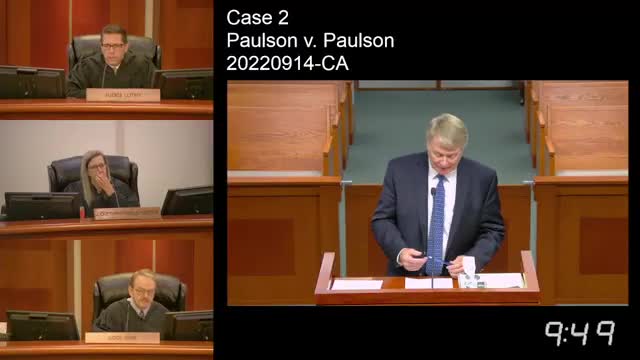Legal Experts Debate Disclosure Rules and Impact on Alimony Summary Judgment
September 25, 2025 | Utah Court of Appeals Live Stream, Utah Appellate Court, Utah Judicial Branch, Utah
This article was created by AI summarizing key points discussed. AI makes mistakes, so for full details and context, please refer to the video of the full meeting. Please report any errors so we can fix them. Report an error »

The recent court session on September 25, 2025, focused on critical issues surrounding expert disclosures and summary judgments in the ongoing Paulson v. Paulson case. The discussions highlighted the complexities of adhering to Rule 26, which governs the requirements for expert disclosures in litigation.
The primary concern raised was the adequacy of expert disclosures, particularly in the context of rebuttal expert reports. One attorney illustrated the challenges faced when the opposing side provided their expert's appraisal reports, leaving only a short window for response. This situation led to difficulties in meeting the disclosure requirements, as the attorney's team was unable to finalize their expert's opinions within the limited timeframe.
The attorney emphasized that while Rule 26 mandates certain disclosures, the practical realities of litigation often complicate compliance. They pointed out that the rule's language suggests that opinions must be fully formed before disclosure, which can be unrealistic given the time constraints imposed by the court. This tension between the rule's requirements and the realities of legal practice was a focal point of the discussion.
Additionally, the attorney noted that the opposing side had a significant advantage, having had a year to prepare their expert's report, while their team was constrained to just two weeks. This disparity raised questions about fairness and the interpretation of the rule, as it appears to require completed work before disclosure, which may not always be feasible.
The session concluded with a call for clarity on how Rule 26 should be applied in practice, particularly regarding the timing and expectations for expert disclosures in complex cases like divorce proceedings. The implications of this discussion could influence future litigation strategies and the interpretation of expert disclosure requirements in Utah courts.
The primary concern raised was the adequacy of expert disclosures, particularly in the context of rebuttal expert reports. One attorney illustrated the challenges faced when the opposing side provided their expert's appraisal reports, leaving only a short window for response. This situation led to difficulties in meeting the disclosure requirements, as the attorney's team was unable to finalize their expert's opinions within the limited timeframe.
The attorney emphasized that while Rule 26 mandates certain disclosures, the practical realities of litigation often complicate compliance. They pointed out that the rule's language suggests that opinions must be fully formed before disclosure, which can be unrealistic given the time constraints imposed by the court. This tension between the rule's requirements and the realities of legal practice was a focal point of the discussion.
Additionally, the attorney noted that the opposing side had a significant advantage, having had a year to prepare their expert's report, while their team was constrained to just two weeks. This disparity raised questions about fairness and the interpretation of the rule, as it appears to require completed work before disclosure, which may not always be feasible.
The session concluded with a call for clarity on how Rule 26 should be applied in practice, particularly regarding the timing and expectations for expert disclosures in complex cases like divorce proceedings. The implications of this discussion could influence future litigation strategies and the interpretation of expert disclosure requirements in Utah courts.
View full meeting
This article is based on a recent meeting—watch the full video and explore the complete transcript for deeper insights into the discussion.
View full meeting

